- Home
- Bruce, Leo
Jack on the Gallows Tree Page 10
Jack on the Gallows Tree Read online
Page 10
Wright seemed to consider this.
“There was one small thing, but I don’t like to mention it and I don’t think it has anything to do with the murders.”
Mr Gilling, who had remained with them, seemed the most interested member of Wright’s small audience.
“Let’s hear it, anyway,” suggested Carolus.
“It was after the pictures. When I took my young lady for a little run round. We happened to stop for a moment …”
“Where was this?”
“Out on the Lilbourne road.”
“But where exactly? Or don’t you know?”
“From what I’ve heard since, I imagine it was very near where Miss Carew’s body was found. It was just before you come to a cottage standing alone on the right hand side of the road.”
“And what time would it have been?”
“I suppose it was getting on for eleven. We just happened to stop for a minute. We were sitting there talking when suddenly my young lady gave a kind of scream. There was a face at the window of the car.”
“Could you see it clearly?”
“I should recognize it again. I suppose my eyes were used to the darkness …”
“I should think they were by that time.”
“Anyway I saw a man with a big ginger moustache staring in.”
“Never seen him before?”
“No. In a few moments I got out of the car, but it was too late. He was cycling away. I shouted, but he wouldn’t stop. I went to pick up a stone to throw at him, because naturally I was very angry. As I did so I saw something white by the side of the road which I thought was a piece of paper. I don’t know what made me pick it up. It was the flower of a lily, just the single bell.”
“I see. You didn’t try to follow this Peeping Tom in the car?”
“No. He was going away from Buddington and my young lady was very upset and wanted to get home.”
“Of course she was,” put in Mr Gilling sympathetically. “Any respectable young lady would have been. I shouldn’t have liked it myself, suffering as I do from nerves. I go cold all over and can’t hardly breathe. It’s as though my heart was going to stop beating. I don’t wonder your young lady felt it.”
“That’s all you have to tell me, Wright?”
“Yes, Mr Deene. I hope you won’t say anything to Miss Tissot about this. She’s very particular, as you know.”
“She knows you have a girl?”
“She knows about my young lady, yes. I don’t tell her more than that, because she’s above such things, if you understand what I mean. She’s a real lady, Miss Tissot is, and won’t have anything to do with them in the hotel.”
“I’m much obliged to you both for your information. Does either of you know Bickley by sight?”
“I know him,” said Gilling, “but he’s not here tonight. She never comes in. TT, I believe. He doesn’t so often come in since Mrs Westmacott bought them a television set. I can’t look at that myself because of my eyes. I get them sore and inflamed if I’m not careful and have to bathe them with boracic. But Mr and Mrs Bickley seem to like it and stay at home looking at it. He won’t come in now because it’s nearly closing time. Yes, I will have a little more gin and water, sir. It’s the only thing I Dare Touch.”
Wright had impatiently waited for a chance to address Carolus.
“What do you think about the murders, sir? Miss Tissot doesn’t like to discuss them, but I believe her opinion is that they must have been the work of a maniac.”
“Of course they were,” said Mr Gilling. “What else could they have been? They were both respectable ladies.”
“Do you think so, sir?” pressed Wright.
“No. I don’t. Nor do the police, so far as I can judge.” He turned to Priggley. “We must get our sandwiches,” he said.
When Carolus and Rupert managed to escape to the corner of the bar in which they had started the evening, Miss Shapely handed them their sandwiches rather as though she were presenting the prizes after the school sports. They ate these gratefully but in silence.
When they returned the empty plate to the bar Miss Shapely condescended to ask how they had got on.
“I saw you talking to Mr Carew,” she said, “and afterwards to that Mr Johnson. I’m pleased to say they’ve both gone. I have to be careful when they’re here because I know they’re both given to using Language.”
Carolus begged her to have a drink with him.
“It’s not often I accept a drink,” said Miss Shapely, “but I will have a touch of gin.”
She poured out a measure of water from a bottle with the familiar Gordon’s Gin label on it and beamed on them magnificently.
“And how did you get on with Mr Gilling?” she asked gently.
“Very well,” said Carolus. “He gave me some first-rate information for my … programme.”
“I’m sure he did. He’s a most respectable gentleman is Mr Gilling. It’s a shame he lost his wife some years ago.”
“He seems to suffer from a number of ailments,” said Carolus mildly.
“Poor man. It’s living alone like that. Makes him dwell on things.”
There was a pause during which Miss Shapely gave an unmistakable sigh and a glance in Gilling’s direction.
“What he wants, what Mr Gilling wants, is Looking After,” she said.
Her reverie seemed to end abruptly with the realization that it was nearly closing-time. She made no mention of this aloud, but whispered to Fred to ‘shout time’.
Carolus told Rupert on the way home that he would have to see John Moore again soon.
“I suppose that means you’re what you call ‘getting somewhere’?”
“Distinctly. Yes.”
“Know who did it?”
“Better than that. I know why.”
11
“TWO more lots to see,” said Carolus, “then I think some action.”
“Action?” yawned Rupert from the depths of an armchair in the Lounge of the Royal Hydro.
“Yes. This case isn’t going to be cleared up by question and answer and a solution like a crossword’s.”
“But what do you mean by action? Crawling about with a magnifying glass?”
“If you were a human boy instead of a hybrid monstrosity you would have read your Stalky and Co and would remember Stalky’s favourite quotation: ‘the bleating of the kid excites the tiger’. You can think over that.”
“I have,” said Rupert promptly. “And it doesn’t seem to promise much but corn. If you suppose that at your time of life you can turn yourself into one of these hard-boiled, steel-gutted, lynx-eyed American sleuths who carry guns and risk their lives every few pages, you’re wildly mistaken. You’re English, sir, as English as Sherlock Holmes and Hercule (Ma foil) Poirot. You’ll never be one of Raymond Chandler’s boys. Stalky and Co! That’s just about your mark.”
“Thank you, Priggley.”
“I mean, hadn’t you better grow up, sir? This is a
nasty business you’re investigating. Really nasty. You talk about seeing two more lots of witnesses or suspects or what have you, then, you say, ‘some action’. Meanwhile I suppose some other poor old girl will have had it.”
“That,” said Carolus firmly, “is what I am going to prevent. But not, as you rightly suggest, by walking about armed. It perhaps hasn’t occurred to you that before catching your murderer it is as well to identify him. I have yet to have drinks at Mr Raydell’s farm to meet his neighbours, Dante Westmacott and his wife.”
“She’s supposed to be beautiful or something, isn’t she?”
“She is.”
“Well, that’s one lot. Who are the others?”
“The others are Mr Maurice Ebony and his assistant Moira.”
“At least we shall have a day in town then.”
“I shall have to go up, yes.”
“Well, you know what you’re doing. I don’t deny that in your old-fashioned way you generally seem to narrow the thing down
to someone with a reasonable amount of evidence against him.”
A pageboy with a small tray handed Carolus a letter.
“Unless I’m mistaken,” said Rupert, eyeing this; “that is the handwriting of your employer.”
“It’s from the headmaster,” admitted Carolus, noting the Brighton postmark.
“Oh, come on, Sir. Show.”
“Certainly not. Go and clean the car while I read it.”
When he was alone he opened Mr Gorringer’s letter, which was headed The Sandringham Private Hotel, Brighton.
MY DEAR DEENE,
In conveying to you my best wishes and those of Mrs Gorringer for your speedy recovery, I feel bound to touch on two matters which have greatly concerned me. It has come to my ears that the boy Priggley, who had instructions from his father to place himself in the care of a private tutor for the duration of the holidays, has not, as I strongly advised, gone with the Hollingbournes to Cornwall, but has betaken himself to Buddington-on-the-Hill where you are recuperating.
The boy’s father, I feel, is greatly to blame in allowing his precocious offspring to make his own arrangements in this way, but entre nous I have reason to know that Priggley père is not a man of high moral rectitude and in fact is spending his time in Italy, where he has formed a liaison of a most undesirable character. He has, however, allowed Priggley no less a sum than £20 a week to be paid to his temporary guardian, and this would have been a godsend to Hollingbourne with his growing family. I readily acquit you of any mercenary motive in the matter, my dear Deene, since I know too well that your ample private income enables you to be indifferent to things which for us labourers in the vineyard are important. But I hope you will perceive how unfortunate is the situation vis-a-vis Hollingbourne, who naturally feels that he has been deprived of one of the few plums our exacting profession has to offer.
The other matter is even graver. Unless my ears deceived me I heard before leaving Newminster a rumour that contrary to your doctor’s orders and my expressed wishes you are again jeopardizing the fair name of the Queen’s School by embroiling yourself in detective work of a nature likely to result in unfortunate publicity. Can this be true? Scarcely out of bed after an illness which deprived us of your help in the term’s examinations, is it possible that you are so ill-advised as to dabble in things better left to the police? If it is indeed the case I feel I have no alternative but to cut short my holiday here and come with all speed to Buddington in order to salvage what I can of the school’s reputation.
I do not wish to be hypocritical about this. It happens that the Sandringham Private Hotel has changed hands since our last stay here and the new proprietors show no disposition to study our comforts as their predecessors did. So I will not pretend that a shortening of my stay would be altogether unwelcome.
I still hope and trust that the rumour which reached me is false and that you are taking a thorough rest in preparation for next term. But I feel bound to ask for your reassurance on this point to make my plans accordingly.
Mrs Gorringer sends you her best wishes and wittily adds that she hopes you won’t allow Priggley to be priggish.
I remain, my dear Deene,
Yours sincerely,
HUGH GORRINGER.
To this Carolus wrote an immediate reply on the elaborately embossed notepaper of the Royal Hydro.
DEAR HEADMASTER,
Many thanks to you and Mrs Gorringer for your good wishes. I have quite recovered from jaundice and feel extremely fit.
If Hollingbourne can manage to persuade himself that the care of Priggley is ‘a plum’, as you say, I am sorry. I regard it as an unmitigated nuisance and did my best to send the little brute down to Cornwall. Nor do I think Hollingbourne would find there was much profit from the boy’s allowance when his wine, cigarette and hotel bills have been paid. If it were not for Priggley’s extraordinary luck or skill in backing horses I imagine he would show a loss.
As for the double murder, yes it’s a most interesting case. I hope to get it cleared up before the beginning of term. If you would like to come here for the dénouement you will find this hotel comfortable in a nursing-home sort of way.
With kind regards to you both,
Yours sincerely,
CAROLUS DEENE.
Carolus decided that on his way out to Furlongs Farm, Raydell’s place at Lilbourne, he would call at the lonely cottage and see Mrs Goggs. Something he had learned in the bar of the Dragon made her evidence on one point interesting. Priggley was against this.
“You keep saying that there was a powerful intellect behind this murder,” he reminded Carolus. “What on earth can farm labourers and such have to do with it?”
“Even if homicidal tendencies did not often inspire the most stupid, there can be a planner and an executive in any crime. But that’s beside the point in the particular enquiry I want to make.”
It was dusk as he approached the cottage, and it certainly had a somewhat desolate look on that lonely road. Nor was the appearance of Mrs Goggs less wild than that of her home as the wind blew her dark hair over her face. There was something gypsyish about her, Carolus decided.
She showed no disposition to ask them into the house this time; indeed she made it clear at once that she was just giving her husband his tea and could not waste time or catch her death out here in this wind. Yet when she understood what had brought Carolus to visit her again she was ready enough to talk.
“Mrs Goggs, the other day you said that you were not on speaking terms with Thickett. Would you mind telling me the cause of that?”
“I don’t know whether it’s anyone’s business only mine,” she said, “but if you knew what I know you’d feel the same.”
“Yes?”
“No excuse for it either. With two girls grown up and one married. You’d have thought anyone would be ashamed.”
“Of what?”
“I said to my husband, if I was ever to catch him up to such larks I don’t know what I wouldn’t do. But Goggs has more respect.”
“Than?”
“I can’t understand it myself. A man with a wife and children. I wonder the police have never done anything about it.”
“What?”
“I don’t say a lot of them oughtn’t to be ashamed of themselves, but coming all this way on his bicycle at night. It’s not right, is it?”
“You haven’t quite explained.”
“Peeping and prying, that’s what. Cycling up to cars and seeing what there is to see through the window, then cycling off. It’s not very nice, is it?”
“No,” admitted Carolus.
“Cunning, too. Always off the way the car’s turned away from so that no one would catch him. You ask my husband. I must run in now. If that isn’t reason enough I don’t know what is.”
“Thank you, Mrs Goggs.”
A malicious leer came into her face.
“Why? You don’t think he’s done it, do you?”
“I’ve no opinions yet.”
“It wouldn’t surprise me,” said Mrs Goggs. “I wouldn’t put anything past him.”
She turned round abruptly and without saying good night disappeared round the corner of the house. Carolus drove on to Lilbourne.
Raydell himself came to the door of his old farmhouse and led Carolus and Priggley into a pleasant room with a low ceiling. A log fire burned in a huge open fireplace and the atmosphere was cheerful. “I’ve not asked the Westmacotts until seven,” said Raydell, “because I thought you ought to meet my old housekeeper. She knew Dante’s mother as a girl.”
“I should like to,” said Carolus.
“Don’t try to talk to her. She can just hear me because she’s used to my voice, but she won’t know what you want. She doesn’t need much encouragement to talk about the past.”
She didn’t. She was a lumbering old creature with a wizened sallow face and she began to talk as if by clockwork. Carolus had the impression that she had gone over her rather dim memories very often
before this to inquisitive listeners.
“They all died together,” she began equivocally. Carolus listened with interest but she at once explained herself. “Well, all within seven years of one another. Madox Brown was the first to go in 1893, then Christina Rossetti the next year, William Morris and Millais in ‘96, Burne-Jones two years later and Ruskin in 1900. I always said there was something funny about it.”
“Ask her about Mrs Westmacott,” said Carolus, whose taste for irrelevance was not without limits.
Raydell did.
“I was a sort of companion to her,” said Miss Lightfoot. “She being a model.”
On this interesting and suggestive statement she did not enlarge.
“Supposed to be beautiful, she was. Just right for pictures of the saints. She wouldn’t have done for it lately, would she? Though you couldn’t tell her that. She still thought she ought to be in a stained glass window. Nearly eighty and expected to look like someone with a halo on. It made me laugh, really, only not to her face. I’m not saying she wasn’t kind, but the bit of money she’s left me has come too late. I don’t think I ought to be done in oils. I’m satisfied to stay where I am.”
Carolus nodded encouragement.
“Mind you, she was lucky, was Rosie Betts. Yes, that was her name, but professionally she was known as Rosamond. She came from the same part of London as I did, but there was no doubt about it, she was very much sought after. They all had a go at her. You can see her in their paintings to this day. Then she met this Westmacott. He had all the money in the world, left him by his father who’d died with all the rest of them, in ‘95 as a matter of fact. He was about the same age as she was.
“I didn’t see her for years after that, though she used to write to me sometimes. But it was through her I came here to look after Mr Raydell after his wife was killed in an air raid in London. I went to see her now and again, but she wouldn’t go about much and used to be taken to church in a bathchair, though she could walk around the house as well as you or I.”

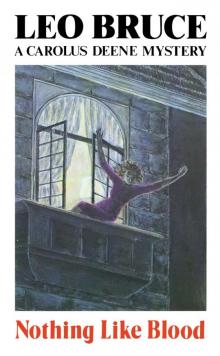 Nothing Like Blood
Nothing Like Blood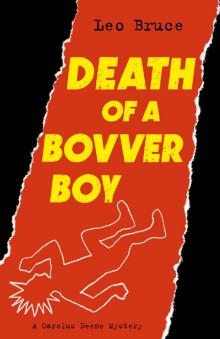 Death of a Bovver Boy
Death of a Bovver Boy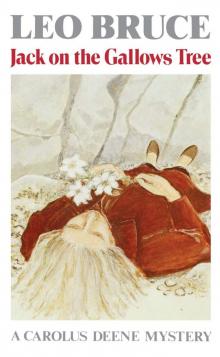 Jack on the Gallows Tree
Jack on the Gallows Tree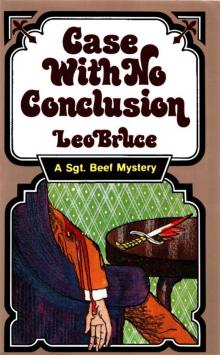 Case with No Conclusion
Case with No Conclusion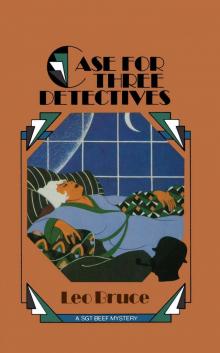 Case for Three Detectives
Case for Three Detectives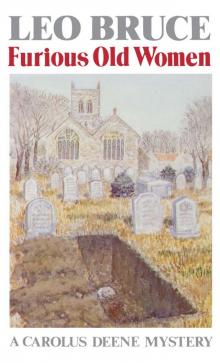 Furious Old Women
Furious Old Women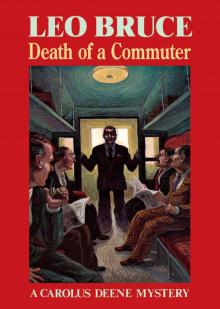 Death of a Commuter
Death of a Commuter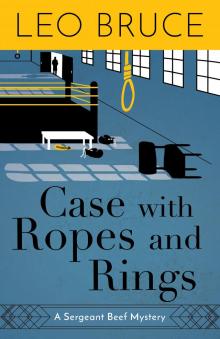 Case with Ropes and Rings
Case with Ropes and Rings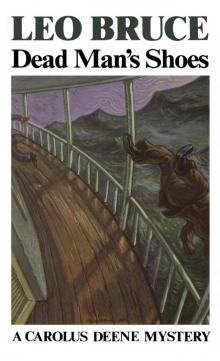 Dead Man’s Shoes
Dead Man’s Shoes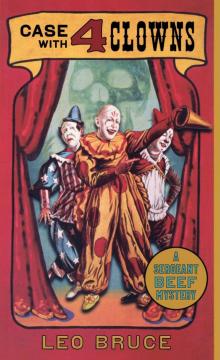 Case with 4 Clowns
Case with 4 Clowns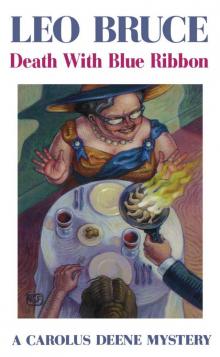 Death with Blue Ribbon
Death with Blue Ribbon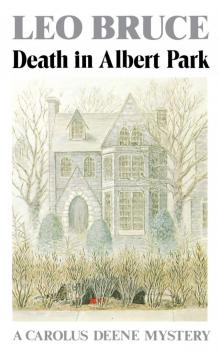 Death in Albert Park
Death in Albert Park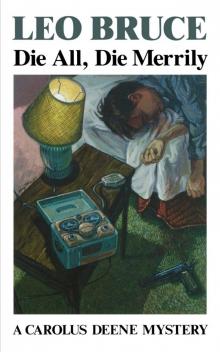 Die All, Die Merrily
Die All, Die Merrily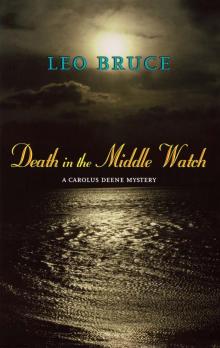 Death in the Middle Watch
Death in the Middle Watch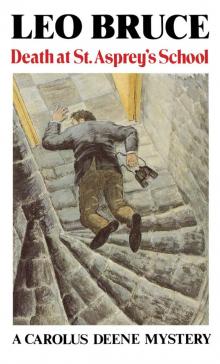 Death at St. Asprey’s School
Death at St. Asprey’s School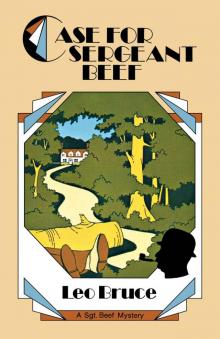 Case for Sergeant Beef
Case for Sergeant Beef